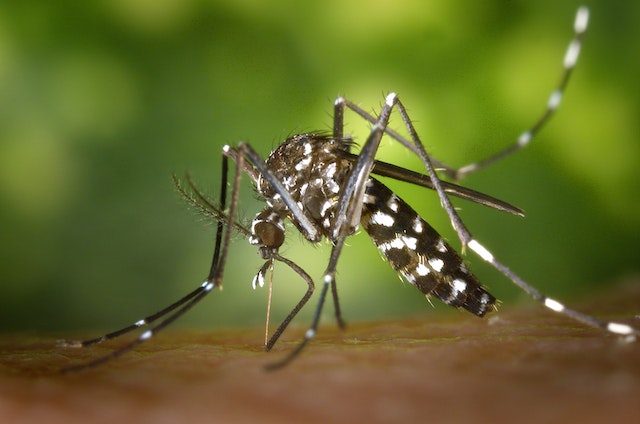
Why do mosquito bites itch? Mosquito and insect bites itch because the immune response is triggered after the mosquito finishes biting.
There are over 110 trillion mosquitoes from 3,000 different species around the world. I have no idea how they managed to calculate the number of actual mosquitoes. The word “mosquito” comes from Spanish where “mosca” means “fly” and “-ito” is a diminutive that means “little”. 3,000 species of mosquito seems like a lot, but only 6% of them actually bite.
Both male and female mosquitoes feed on nectar, aphid honeydew and plant juices. Only the female mosquitoes can also bite and feed on the blood of animals. For some species this is because they need the protein from blood to develop their eggs. In other species, the protein from blood helps them to lay even more eggs. The females have cpA neurons that detect carbon dioxide, perspiration, and lactic acid, allowing them to find animals.
When they bite you, they puncture the skin and use something called the labrum (like a long pipe) to probe for a blood vessel. When they have found a suitable vessel, they inject saliva. This saliva has anti-coagulants and blood thinners in it, to keep the blood flowing, and it also stops the immune response while the mosquito is drinking, meaning it is very hard to notice that you are being bitten.
The blood flows into the mosquito, where they are able to separate out and expel the water while they are drinking. This lets them take in far more blood than they would be able to if they had to hold the water as well. Then, a nerve inside their stomachs tells them that they are full, and they happily fly off. If this nerve is deactivated, the mosquito will feed on blood until it bursts.
So, why does the bite itch? The saliva that the mosquito injects into you is a foreign chemical and your body attacks it with histamines that are your body’s defense against foreign chemicals. The histamine spreads the blood vessels apart, making fluid leak into the skin, which makes the bitten area swell. It does this to make space so that the damaged tissue can be cleared out and the tissue can be repaired. However, when the area swells, the histamine triggers nerve receptors in your skin which cause the itching. Scratching seems like a good idea, but this just does more damage, triggers more histamine, and causes more itching. The best thing to do is wait. Well, the best thing to do is to not get bitten in the first place.
How can you avoid getting bitten? The easiest way is to not be where the mosquitoes are. Mosquitoes prefer to lay their eggs in stagnant water, such as ponds, marshes, swamps, and wetlands. They also prefer hot and humid weather.
Incidentally, this saliva that thins the blood and stops the immune response makes it very easy for the malaria virus to make the jump from the mosquito to the human. Malaria is a disease caused by a parasite that lives in infected mosquito and is transmitted to animal hosts when they are bitten by the mosquito. In 2020 there were 240 million cases of malaria worldwide and 627,000 deaths. When a person is bitten by an infected mosquito, the malaria parasite enters the blood and travels to the liver. Once in the liver it begins to multiply and sends new versions out into the blood stream. These new versions invade red blood cells and continue to multiply. This is what causes all the symptoms of malaria. Some of the parasites stay dormant in the blood stream and simply float around, waiting for the person to be bitten by another mosquito so they can infect that mosquito and travel on to another host. Very clever. There are drugs that can kill the malaria parasite, but the parasites are slowly becoming immune to them. This is very similar to how antibiotic immunity is spreading among bacteria.
It might be easy to wonder what benefits mosquitoes bring to nature. The answer is that they are a valuable food source for a lot of other animals, such as dragonflies, and they aid in pollination of plants.
So, why do mosquito bites itch? Because the immune response releases histamines that make the bitten area swell, triggering the itch response. And that is what I learned today.
Sources
https://www.yourgenome.org/facts/how-is-malaria-treated-and-prevented/
https://en.wikipedia.org/wiki/Malaria
https://www.orkin.com/pests/mosquitoes/mosquito-habitats
https://en.wikipedia.org/wiki/Mosquito
https://www.medicalnewstoday.com/articles/320979
https://www.goodrx.com/conditions/itching/why-mosquito-bites-itch-how-to-stop
https://www.healthline.com/health/why-mosquito-bites-itch#_noHeaderPrefixedContent
